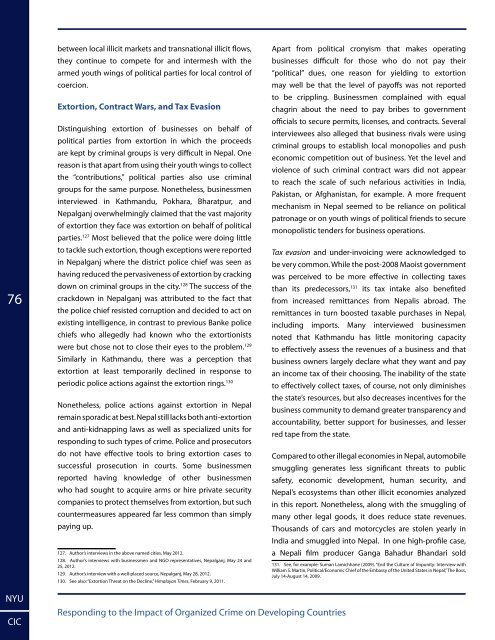here - Center on International Cooperation - New York University
here - Center on International Cooperation - New York University
here - Center on International Cooperation - New York University
Create successful ePaper yourself
Turn your PDF publications into a flip-book with our unique Google optimized e-Paper software.
76<br />
between local illicit markets and transnati<strong>on</strong>al illicit flows,<br />
they c<strong>on</strong>tinue to compete for and intermesh with the<br />
armed youth wings of political parties for local c<strong>on</strong>trol of<br />
coerci<strong>on</strong>.<br />
Extorti<strong>on</strong>, C<strong>on</strong>tract Wars, and Tax Evasi<strong>on</strong><br />
Distinguishing extorti<strong>on</strong> of businesses <strong>on</strong> behalf of<br />
political parties from extorti<strong>on</strong> in which the proceeds<br />
are kept by criminal groups is very difficult in Nepal. One<br />
reas<strong>on</strong> is that apart from using their youth wings to collect<br />
the “c<strong>on</strong>tributi<strong>on</strong>s,” political parties also use criminal<br />
groups for the same purpose. N<strong>on</strong>etheless, businessmen<br />
interviewed in Kathmandu, Pokhara, Bharatpur, and<br />
Nepalganj overwhelmingly claimed that the vast majority<br />
of extorti<strong>on</strong> they face was extorti<strong>on</strong> <strong>on</strong> behalf of political<br />
parties. 127 Most believed that the police were doing little<br />
to tackle such extorti<strong>on</strong>, though excepti<strong>on</strong>s were reported<br />
in Nepalganj w<str<strong>on</strong>g>here</str<strong>on</strong>g> the district police chief was seen as<br />
having reduced the pervasiveness of extorti<strong>on</strong> by cracking<br />
down <strong>on</strong> criminal groups in the city. 128 The success of the<br />
crackdown in Nepalganj was attributed to the fact that<br />
the police chief resisted corrupti<strong>on</strong> and decided to act <strong>on</strong><br />
existing intelligence, in c<strong>on</strong>trast to previous Banke police<br />
chiefs who allegedly had known who the extorti<strong>on</strong>ists<br />
were but chose not to close their eyes to the problem. 129<br />
Similarly in Kathmandu, t<str<strong>on</strong>g>here</str<strong>on</strong>g> was a percepti<strong>on</strong> that<br />
extorti<strong>on</strong> at least temporarily declined in resp<strong>on</strong>se to<br />
periodic police acti<strong>on</strong>s against the extorti<strong>on</strong> rings. 130<br />
N<strong>on</strong>etheless, police acti<strong>on</strong>s against extorti<strong>on</strong> in Nepal<br />
remain sporadic at best. Nepal still lacks both anti-extorti<strong>on</strong><br />
and anti-kidnapping laws as well as specialized units for<br />
resp<strong>on</strong>ding to such types of crime. Police and prosecutors<br />
do not have effective tools to bring extorti<strong>on</strong> cases to<br />
successful prosecuti<strong>on</strong> in courts. Some businessmen<br />
reported having knowledge of other businessmen<br />
who had sought to acquire arms or hire private security<br />
companies to protect themselves from extorti<strong>on</strong>, but such<br />
countermeasures appeared far less comm<strong>on</strong> than simply<br />
paying up.<br />
127. Author’s interviews in the above named cities, May 2012.<br />
128. Author’s interviews with businessmen and NGO representatives, Nepalganj, May 24 and<br />
25, 2012.<br />
129. Author’s interview with a well-placed source, Nepalganj, May 28, 2012.<br />
130. See also: “Extorti<strong>on</strong> Threat <strong>on</strong> the Decline,” Himalayan Times, February 9, 2011.<br />
Apart from political cr<strong>on</strong>yism that makes operating<br />
businesses difficult for those who do not pay their<br />
“political” dues, <strong>on</strong>e reas<strong>on</strong> for yielding to extorti<strong>on</strong><br />
may well be that the level of payoffs was not reported<br />
to be crippling. Businessmen complained with equal<br />
chagrin about the need to pay bribes to government<br />
officials to secure permits, licenses, and c<strong>on</strong>tracts. Several<br />
interviewees also alleged that business rivals were using<br />
criminal groups to establish local m<strong>on</strong>opolies and push<br />
ec<strong>on</strong>omic competiti<strong>on</strong> out of business. Yet the level and<br />
violence of such criminal c<strong>on</strong>tract wars did not appear<br />
to reach the scale of such nefarious activities in India,<br />
Pakistan, or Afghanistan, for example. A more frequent<br />
mechanism in Nepal seemed to be reliance <strong>on</strong> political<br />
patr<strong>on</strong>age or <strong>on</strong> youth wings of political friends to secure<br />
m<strong>on</strong>opolistic tenders for business operati<strong>on</strong>s.<br />
Tax evasi<strong>on</strong> and under-invoicing were acknowledged to<br />
be very comm<strong>on</strong>. While the post-2008 Maoist government<br />
was perceived to be more effective in collecting taxes<br />
than its predecessors, 131 its tax intake also benefited<br />
from increased remittances from Nepalis abroad. The<br />
remittances in turn boosted taxable purchases in Nepal,<br />
including imports. Many interviewed businessmen<br />
noted that Kathmandu has little m<strong>on</strong>itoring capacity<br />
to effectively assess the revenues of a business and that<br />
business owners largely declare what they want and pay<br />
an income tax of their choosing. The inability of the state<br />
to effectively collect taxes, of course, not <strong>on</strong>ly diminishes<br />
the state’s resources, but also decreases incentives for the<br />
business community to demand greater transparency and<br />
accountability, better support for businesses, and lesser<br />
red tape from the state.<br />
Compared to other illegal ec<strong>on</strong>omies in Nepal, automobile<br />
smuggling generates less significant threats to public<br />
safety, ec<strong>on</strong>omic development, human security, and<br />
Nepal’s ecosystems than other illicit ec<strong>on</strong>omies analyzed<br />
in this report. N<strong>on</strong>etheless, al<strong>on</strong>g with the smuggling of<br />
many other legal goods, it does reduce state revenues.<br />
Thousands of cars and motorcycles are stolen yearly in<br />
India and smuggled into Nepal. In <strong>on</strong>e high-profile case,<br />
a Nepali film producer Ganga Bahadur Bhandari sold<br />
131. See, for example: Suman Lamichhane (2009). “End the Culture of Impunity: Interview with<br />
William S. Martin, Political/Ec<strong>on</strong>omic Chief of the Embassy of the United States in Nepal,” The Boss,<br />
July 14-August 14, 2009.<br />
NYU<br />
CIC<br />
Resp<strong>on</strong>ding to the Impact of Organized Crime <strong>on</strong> Developing Countries
















